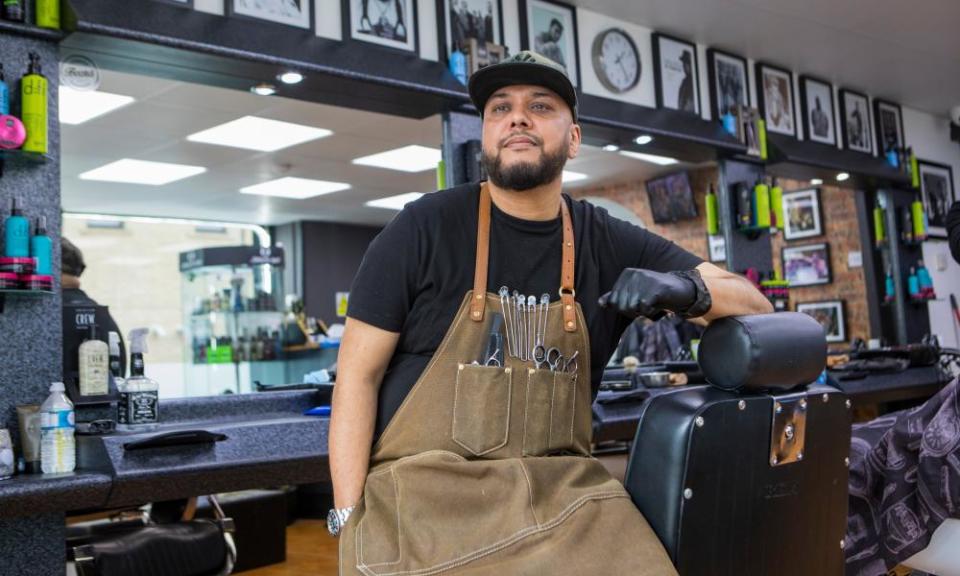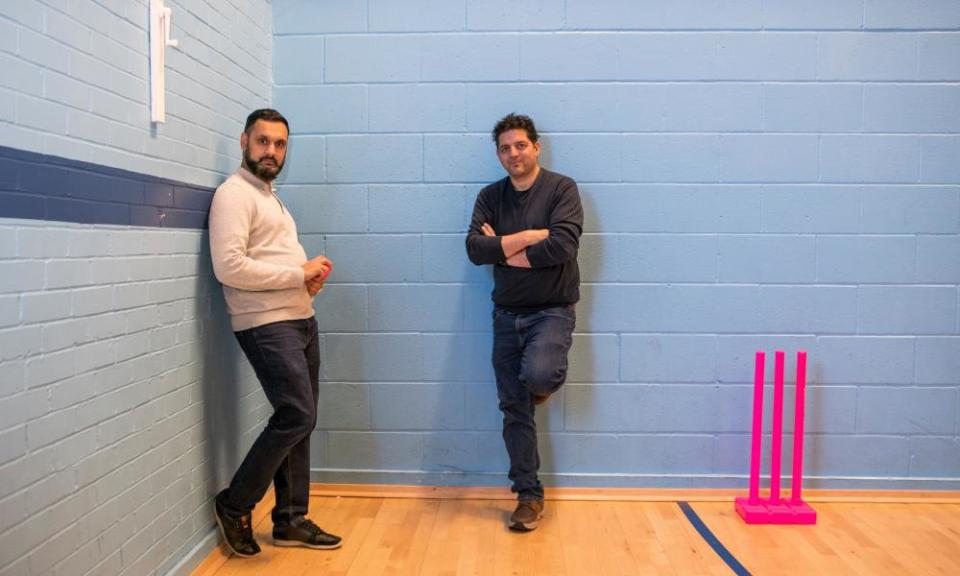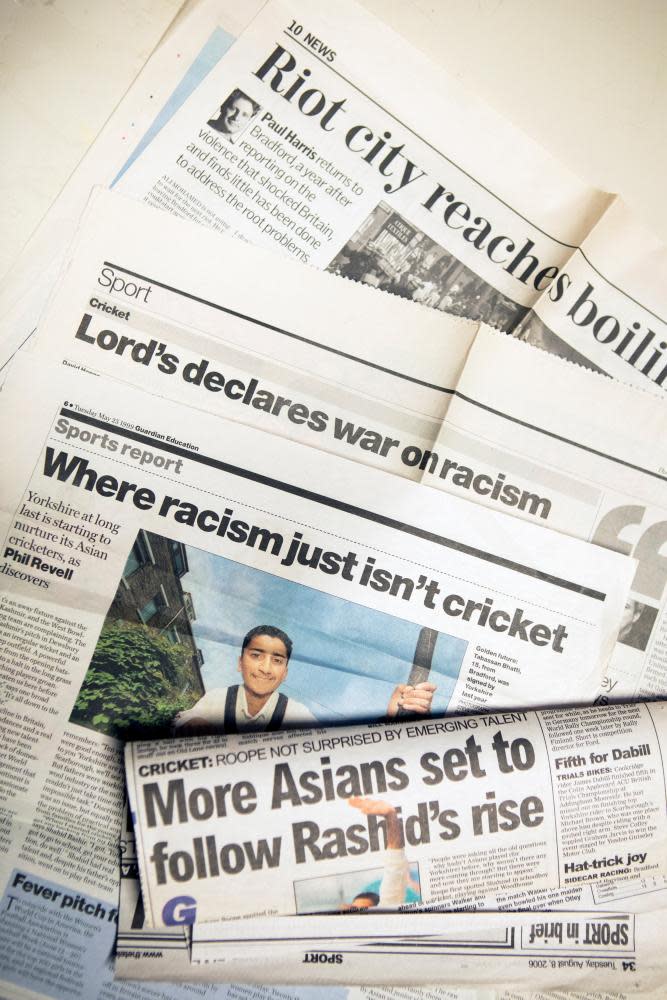‘It’s not about cricket’: Rafiq testimony resonates with Yorkshire’s Asian community

Every year, a British Asian small business owner in West Yorkshire sends his neighbour a card and leaves a gift on his doorstep. And every year, without fail, that neighbour ignores him.
“Ever since we moved in, he won’t look at me and my family; he doesn’t respond when we say ‘hello’. He even planted conifers so we couldn’t see into his garden and he can’t see us,” the man, who wished to remain anonymous, said. “But I still send him Christmas cards and buy him a gift. He won’t even open the door when I knock, so I just leave it on the doorstep.”
Azeem Rafiq’s devastating testimony on the racism he experienced as cricket player has resonated deeply with the British Asian community in Yorkshire. The shocking allegations, in which words and phrases such as the P-word, “elephant washers” and “you lot” were commonplace and which stated that players of colour were referred to as “Kevin”, has shone an intense light on prejudice in the sport.
But the issue of racism in the ethnically diverse Yorkshire region goes much further than just cricket. The business owner is one of many to have been prompted by Rafiq’s testimony to reflect on poisonous interactions that are part of daily life..
Atif Aslam, a 26-year-old youth worker in Sheffield, used to tell people he had not personally experienced racism. But he has a number of memories of walking home from the mosque as a young child wearing his traditional clothing, and white men in white vans shouting the P-word as they drove past.
“You internalise it as that’s the norm,” said Aslam, who works for the Ellesmere Youth Project, which is part of Levelling the Playing Field, a national initiative that engages children from ethnically diverse communities in sport to prevent them from becoming involved in crime. “It was so common that it didn’t faze us. We never went home upset about it.”
That disconnect finally ended this week after Rafiq’s appearance before a parliamentary select committee. It was described as a landmark moment for cricket and Rafiq, who was brought to tears as he recounted his racial abuse, won widespread praise for his resolve and courage.
Haris Muhammad, a 33-year-old FA-qualified referee in Leeds, who volunteers for Muslim Engagement and Development, a nonprofit organisation that fights Islamophobia, said the testimony forced him to think about why good people said nothing. “There is a lot of apathy to people witnessing something like that. Although it may concern them internally, they’re not going to do anything about it.” But he believes people are now more receptive to being criticised for making hurtful remarks than they were a few generations ago.
Mohamed Raje, 48, who was born in Batley, and owns The Studio, a popular barber shop in Heaton, Bradford, was keen to emphasise that “there are many good people” and he has friends and customers from all cultures, creeds and religions.
Wearing his stylist’s apron with pride, Raje, who has run his own business for 28 years, said he knew from personal experience that institutional racism existed. “I’ve been a hairdresser since I was 13,” he said, “and I used to work in quite a prestigious salon, and would find that I never used to get promoted, but people behind me always would.”
He recalled his school days, at an all-boys school where “at the end of term, there would be [P-word]-bashing from the white lads”.
These days, people wouldn’t use the P-word to his face, but “people use it”. “If I’m in a room, white lads might refer to the [P-word] in the room,” he said. On a human level, Raje said he preferred to always rise above any hate he was shown, but, making reference to the British army’s colonial history in India, he said: “In some institutions, the Asian will always be the chaiwallah. Always the one bringing the tea and clearing up.”
A customer who had just had his beard trimmed with his young son, but did not want to be named, said: “It’s not about cricket, love; racism is embedded. And the hierarchy starts at the government and goes all the way down to Joe Bloggs in the corner shop.
“They need to really understand the history and we need to understand that we will never be accepted in this country. We were born here, we studied here, we spend our money here, we pay our taxes here, are we ever going to be accepted in society? We never will be.”
A few doors down, Balquis Rashid, the owner of a cafe, Fresh Fillingz, while serving panini and lasagne, said she felt hopeful that times had changed. “I was a 70s child, there was a lot of it back then, with the National Front. But in 19 years of running this cafe, I’ve never had a problem. We’re always slated in the media, but Bradford is an amazing place.”

A few miles away at Parkside sports centre, a community hub, an after-school session for the children of Afghan interpreters who had recently arrived in the ward was being held. For Talat Sajawal, the 42-year-old manager, and Haqueq “Aki” Siddique, 54, who runs the West Bowling Youth Initiative, which supports young people through volunteering projects, the conversation sparked by Rafiq’s experiences was nothing new.
The pair, cricket-lovers who coach junior teams, took part in a documentary about the problems of class, race and cricket in Yorkshire back in 1993. In his office, Siddique pulls out a thick file of newspaper clippings, including several articles about racism in the sport dating back decades. When the former Bradford North MP Terry Rooney called out the club for racism in 2004, he was met with fury and calls to apologise. “It’s been there for years,” the youth worker said.
Siddique described the challenges to hit his community as “A, B, C”, for austerity, Brexit and Covid. The ward of Little Horton has one of the highest rates of youth unemployment in Bradford, and 40% of the children in Bradford East live in absolute poverty, double the national rate. Alongside many in the community, he lost his mother to coronavirus in the early days of the pandemic. “There’s no space left in the graveyard around here,” he said.
The community could also add D – for discrimination. “We just don’t need this,” said Siddique. Listing talented young cricketers whose dreams they had seen shattered by racism, both men dismissed past initiatives increasing representation as “box-ticking” exercises that did little to improve the situation.

Siddique evokes Harry Enfield’s comedy character George “Integrity” Whitebread, a stereotypical Yorkshireman. “You know, that ‘I like what I say, and I’ll bloody well say what I like’ – there’s a lot of different types of Yorkies and there’s a lot of good folk … but there’s also a sense of territory, almost like a dog pissing on a lamp-post. That sums up Yorkshire in a way, very proud folk.”
Sajawal, who is also an independent local councillor, described the generational differences in terms of attitudes to racism. “Our parents experienced the raw form first-hand,” he said, but they had believed for years that they would eventually return to Pakistan and so “just put up with it”.
“In any Asian family, there’s always been a genuine fear that one day they’re going to kick us out of England.
“The feeling from people in my generation is that we’ve always been the underdog, being south Asian.” He also sees the effect of discrimination in the young people he supports: “It’s had a knock-on effect to people’s confidence.”
For Aslam, who is a level 2 cricket coach and runs sessions for young kids in the local area, Rafiq’s declaration that he would not let his son play was particularly agonising to hear. Many of the young people he works with have the potential to rapidly progress and play in local clubs.
But he finds himself asking the same question that many others have this week: “How do I feel comfortable sending these kids to these places?”

 Yahoo Sport
Yahoo Sport 





































